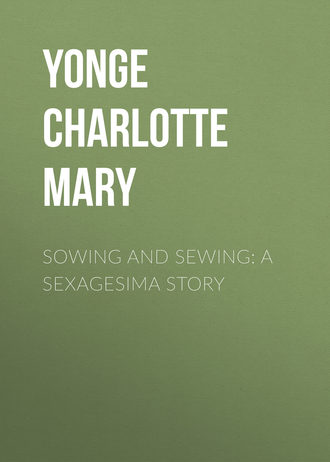
Sowing and Sewing: A Sexagesima Story
"Oh, well, I'll see to that," said Grace, "when it gets too dark for work. One must put up with a little for such a chance as this."
Jessie felt that her poor mother was putting up with more than a little, as she saw her sit down with a sigh and try to thread her needle by the window. Jessie went across and did it for her, and put back the muslin blind so as to let in more light; then sat down to finish the "na" of her sixth Nina, rather wearily, and with an uncomfortable thought that Miss Needwood's satin-stitch looked better than her own.
Little "n" was done before the twilight tidying, which did not amount to much, for Grace soon lighted the lamp; but Jessie, in putting up the shop shutters, made the arm, which had once been crushed, tremble so much that she could not work without pricking her finger, and Mrs. Hollis really could not see. So Grace let them both go to bed, and Jessie half waked to hear her bustling about, and coming up herself just after the clock struck twelve. She would not have set a stitch on any account after that!
Jessie was up early enough to light the fire, and set out the breakfast things, and put on the kettle, while both her mother and Grace were still in bed. She had a peaceful, happy time then, but otherwise she had never known such an uncomfortable Sunday.
Mrs. Hollis was down when she came back, but was fretting over the very large bit that had gone out of the cheese. Jessie thought they had eaten it for want of meat; her mother suspected Jenny Simkins. Then she had not been allowed time to copy out her accounts into the book, and there had been a great puzzle between a three and a five on the slate last night, which seemed to have been worrying her all night in her dreams; and the uncleaned look of the house vexed her. She was tired and not like herself, and Jessie only left her for school and church on hearing Grace's step on the stairs.
At school she could forget all about it in the interest of teaching, but the worry returned when her mother's place was empty at the beginning of the service; and when Mrs. Hollis did come posting in at the end of the Venite, she was so hot and panting that she had to sit down and fan herself with her pocket-handkerchief all through the Psalms, and Jessie even feared she might be going to faint.
"Oh dear," Mrs. Hollis mourned, when they came out of church, "she had never been so upset before, but she had been so put about to get off, with none of her things ready, and she was that tired and sleepy she had not heard a word of the sermon. Grace really had undertaken too much. The house was in such a mess there was no sitting down quiet and respectable, and there was threepence in the till that would not be accounted for, and she was sure that the cheese was going too fast." She fretted all the way home, and Jessie could not comfort her, by promising to look over the accounts the first thing on Monday.
However, on coming home they found the whole house tidied, dinner laid, the pie made and just ready to come out of the Dutch oven, and the accounts balanced and written out fairly. Grace was just finishing the arraying herself in full Sunday trim outside, but how was it with the inner Sunday raiment of her heart?
She did nothing but talk about "seam and gusset and band," and how fast she was getting on, and how good the linen was, and what sort was the best, till Jessie thought she might almost as well have been sewing all day as with her thoughts running on nothing else.
When Jessie went to afternoon school, both Mrs. Hollis and Grace were so tired that the one went to sleep in her chair, and the other on her bed; and thus Jessie found them on her return.
Poor mother! how weary and worn her face looked after this week of worry. The sight of it settled Jessie's mind. She went up softly to take off her things, and as she was doing so, Grace awoke. Jessie went up to her and showed her Miss Needwood's cipher.
"Bless me! whose is that? It is real genteel," said Grace.
"It is Miss Needwood's at Chalk-pit Farm."
"What! that poor helpless thing that never can keep a situation! Did you get it for a pattern, Jessie?"
"Yes," said Jessie; "she lent it to me."
"It is beautiful," said Grace, examining it minutely. "You ought to work like that, Jessie."
"I would if I could," said Jessie, "and I mean to try; but, Grace, I shall only finish this first dozen. I shall send the other five dozen to Bessie Needwood. She is in great want of work, and will do them much better than I."
"Well I never!" cried Grace. "I never thought you'd turn lazy, and give up what you had undertaken—when I had asked for the handkerchiefs on purpose for you, because I thought a little pocket money would come in convenient!"
"So it would. It was very kind of you, Grace; but Miss Needwood will do them better than I."
"Not than you if you chose to take the pains and trouble."
"No," said Jessie, "if I don't hurry them too quick to try to do those finest stitches, I sha'n't have time to do them at all, in these after hours of mine."
"Well, that you should choose to confess yourself not able to do as well as a poor dozing thing like that! It's all laziness."
"No, that it is not," said Jessie, rather hotly. "I thought if those were off my hands I could help you, and then mother need not have any of this work to do, or be so driven and put about."
"You don't expect to be paid for any part of mother's work," said Grace, with some sharpness. "I've got my own use for that in the business."
"No, I don't!" and Jessie went suddenly off in a little bit of temper for which she was sorry afterwards, wishing she had said that her real reason—besides the helping Miss Needwood—was the hope to save her mother from being over driven, and not to have another Sunday so cumbered with worldly matters.
Grace came down to tea grumbling, and appealing to her mother about Jessie's laziness; and Mrs. Hollis, for whose sake the girl had resigned five-sixths of her hoped-for gain, was inclined to be vexed at any of the work going out of the family, or her Jessie allowing herself to be beaten.
It was very vexatious, and Jessie was glad when Uncle Andrew dropped in to tea, and to change the current of their thoughts.
She was to stay at home to guard the house while the others went to evensong, and this gave her the quiet opportunity of packing up five dozen handkerchiefs, and writing a note to send with them to Bessie Needwood the first thing in the morning, by any child who came early to the shop.
Then she felt much more at ease, and was able to have a comfortable study of her next Sunday's Gospel and its references, in case she should be too busy on the week days; and so she was peaceful and refreshed, and able to enjoy a quiet little wander in the twilight garden with her hymn-book. This lasted till the others came home, brim full of reports they had picked up about the splendour of the coming wedding. The gentleman, Mr. Holdaway, was staying at Newcorn Park, and, what was more, he had sent his horses and grooms down to the Manners Arms, because the stables at the Chequers were not well kept.
The head groom had actually been at Church, and looked quite the gentleman, though to be sure he did stare about wonderfully.
Mrs. Hollis shook her head, and said no good came of that sort of folk.
CHAPTER VII
WANDERING EYES
"I assure you he said he had never seen a place with more pretty young ladies in it."
"Who?" said Jessie, coming suddenly into the light closet of the work-room, where Florence Cray was taking off her hat, and Amy Lee seemed to be helping her.
"Why, Mr. Wingfield, Mr. Holdaway's head groom, who has come over with another man and a boy, and three of the loveliest horses you ever did see."
"Oh, yes, I heard," said Jessie; "and how he stared about at Church! He ought to be ashamed of himself."
"Oh! that's what Grace says, of course," said Florence; "and she's a regular old maid. She needn't fear that he'll stare at her."
Wherewith both Florence and Amy giggled, and before Jessie's hot answer was out of her mouth, one of the aunts called out—
"Girls, girls, what are you doing? No gossiping there."
Florence came out looking cross, and observing in a marked manner that Miss Fuller, at Ellerby, always spoke of her young ladies.
"I like using right names," said Aunt Rose in her decided voice.
Florence was silenced for the time, but at the dinner hour she contrived to get Amy alone. Jessie was in haste to get home to see if there were an answer from Miss Needwood, and also to try to get enough sewing done to pacify Grace, and purchase a little leisure for her mother. And Florence, instead of going home, stood with Amy, who had sauntered into the garden to refresh herself and gather some parsley.
"I assure you, Amy, he was quite struck. He said yours was such a style that he would hardly believe me when I said you belonged to Mr. Lee, the baker. It was the refinement, he said."
"Nonsense, Florence; don't," said Amy, blushing as crimson as the rose she tried to gather.
"I'm not talking nonsense; I never did see a poor man so smitten."
"Now, Florence, you shouldn't say such things; father and aunts would not like it. I shall go in."
"Fathers and aunts are all alike; they never do like such things. But–"
However, Amy was safe indoors by this time, all in a glow, very much ashamed that such things should have been said to her, and yet not a little fluttered and pleased. She had been most carefully brought up and watched over, and she had come to the age of sixteen without hearing more about herself than that a young lady, who once came into the school with Miss Agnes Manners, said something that sounded like lovely, and was speedily hushed up and silenced.
All the other girls thought the young lady meant Henrietta Coles, who was tall, with bright dark eyes, red cheeks, and black hair, under a round comb; but Amy had always been sure that the speaker's eyes were upon her, though she had been ashamed of the belief, and indeed had nearly forgotten all about it, till it was stirred up by Florence's talk.
She went up to her room to smooth her hair before dinner. Yes, it was very nice light-brown hair, with a golden shine; and her eyes were very clear and blue, and her skin very white, with a rosy flush; and her nose was straight, and the shape was a pretty delicate one. Amy really did think Mr. Wingfield was right, and had better taste than the people who thought her a poor washy, peaky thing, as she had more than once heard herself called.
She put her head on one side, smirked a little, half shut her eyes, and studied herself in different positions, till she heard one of her aunts on the stairs; and then, in a desperate fright lest she should be caught, she darted out so fast as to run against Aunt Charlotte coming up stairs with a basket of clean linen from the wash. There were three pairs of stockings rolled up on the top, and these tumbled out, and one pair went hop, hop, from step to step all the way down stairs, just as Father was coming in, and he caught it up and threw it like a ball straight up at his sister.
The confusion drove the nonsense out of Amy's head for the present. She ate her dinner, and then went off as usual for her visit to little Edwin Smithers, carrying him only a few strawberries, as she knew he always had soup from the Hall on a Monday.
For Edwin had not died. He had rather grown better than worse, and if the truth must be told, Amy had begun to get a little tired of him. He was not a quick child, and in this hot weather he often failed to do the sums or learn the verses that Amy set him.
To-day he was nursing a great piece of stick-liquorice with which he had painted a dirty spot on the central face in the picture of the number of the Chatterbox which she had lent him. She scolded him for it, and he turned sulky, and would not try to repeat his hymn, nor answer any questions, and looked at his book as if he had never seen one before.
Amy grew angry, told him he was a naughty boy, and she should not stay with him nor give him any strawberries; and off she went, carrying away the injured Chatterbox, and never bethinking herself that the hot day and the weariness of the dull untidy room might not be the cause of the naughty fit, and whether it would not have been kinder and better to try to soothe him out of it.
But instead of this she paused to hear Mrs. Rowe declare he was a bad 'un, with a nasty sulky temper that no one could do nothing with, and just then she saw Florence Cray crossing the village green.
"I've just been to get a little red pepper at Hollis's," she said, as she put her arm fondly into Amy's. "Mr. Wingfield do like something tasty for his breakfast, and ma is going to do him some devilled kidneys to-morrow morning. He is quite the gentleman in all his tastes, you see! I wanted Jessie to walk back with me, but they are all so terrible busy over that there wedding order, that she could not come till the last minute."
"Working all through the dinner hour!" said Amy. "What a shame!"
"So I say. But that Grace Hollis is a one! I wouldn't have her for my sister. Here, come in, Amy, I must just give mother the pepper."
"No, I can't do that," said Amy, uneasily, for she knew her father would be displeased if she went into a public-house; though as Florence said, "Gracious! You needn't go near the bar. It's only the back door! As if I would ask you to do anything you ought not! But I suppose our house ain't good enough for you."
"Oh! don't be angry, Florence dear, I'll come some day when I've got leave."
"Leave indeed, at your age; but you're a poor-spirited thing, Amy, to be so kept down by a couple of old aunts."
Amy was flurried at the displeasure, and wanted to make it up. "Oh! don't be offended, Florence. Look here."
"Strawberries! oh my! already! Thank you," and Florence had soon swallowed up poor little Edwin's strawberries.
"Wait here one moment then," she said, "and I'll be back with you in an instant."
Amy stood under her parasol, trying to make the most of the small shelter afforded by Mr. Cray's garden hedge, and recollecting rather uncomfortably something she had once been told about the loitering of the disobedient Prophet being what brought him into temptation. But, having promised to wait, she could not move away, though she had to stay longer than she liked, especially as the children were going by to afternoon school, and some of her own class began to stare at her.
However, at last Florence came out, quite excited. "Oh, Amy, if you'll only wait a minute, you'll see him come out."
"I can't! I can't! Let us go," cried Amy, quite shocked and shy.
"Nonsense! Poor man, he need never see you. He is just going to take the horses up for his master to ride out with Miss Robson. Such sweet horses! Mr. Holdaway gave 120 guineas for his. Think of that, Amy! Here now, come round the corner of the hedge, and he'll never see you."
So Amy followed and peeped, very shy and frightened, like a guilty thing, and she did see two horses, much more beautiful than she knew, one ridden by a common-looking groom, the other by a very smart, well set-up person, with a belt round his waist. That was all she saw, for they were gone in a flash, and she was too uncomfortable to see much, or to do more than hurriedly answer Florence's exclamation—
"Ain't he quite the gentleman? Bain't his horses real darlings?" before Jessie's voice was heard—
"Why, whatever are you two doing here?"
The two girls both giggled, and each pushed the other to make her tell, and Florence laughed out—
"Oh, 'twas Amy wanted to see Mr. Wingfield pass by."
"No, 'twasn't. 'Twas you," said Amy.
"I don't see why you should get into a corner about it," said Jessie, rather gravely. "I've just met him straight upon the road, horses and all."
"O yes, you!" said Florence.
"Well, why not me?"
"O, you know, you'll soon be an old maid like your sister."
Jessie had not grown so wise as not to be nettled at this silly impertinent speech, but she was much more vexed to see that Florence was teaching Amy her own follies—Amy, who had always seemed like a pure little innocent wild rose-bud in its modest green leaves. So she answered, rather shortly—
"If you mean that I don't want to be right down ridiculous, I hope I am an old maid."
This seemed to be very funny, for Florence went off in fits of laughing, and kept shouldering Amy to make her see the joke, but Amy had by this time grown ashamed and frightened and only answered, "Don't."
So the three girls went in together, and no one took any special notice of Amy's hot face and uncomfortable gestures. It was the first time since she had been a very little child that she had shrunk from her aunts' eyes, or feared that they should ask her questions; and the sense that she had been undeserving of the trust they placed in her made her very ill at ease, though the silly girl did not do the only thing that would have set her right again, and made her safer for the future.
Jessie meanwhile had forgotten the little vexation. She had something to brighten her up in Miss Needwood's little note.
It was written on pink paper, edged with blue, as if nothing could be too good for Jessie; and it said no words could tell how glad she was, and what a comfort it was to have this real work to do. "It is really like a ray of hope in the darkness," said poor Bessie, in her little thin weak writing, with a very hard steel pen.
But that note warmed up Jessie's heart, although her finger was getting severely ploughed up with the stitching she had been doing to save her mother's eyes.
"There was not to be an inch of machine work," Mrs. Robson had said, and the Hollises were people who fulfilled all they undertook.
But Jessie's hour at home had helped and freshened her mother, who looked much less worn and worried than she had done the day before. Jessie felt she had done well to send away the handkerchiefs, and lessen the burthen Grace had taken upon the family.
CHAPTER VIII
AMY'S VISITS
Nobody could say any great harm of Florence Cray, or she would not have been bound to Miss Lee.
But she was one of those silly, vulgar-minded girls who think life is nothing without continually chattering either to young men or about them. She was in no hurry to be married, for then she knew she must give up all her lively pastime with the lads around her. Not that she frequented the bar, or had anything to do with the customers—her mother kept her carefully from that; but she had plenty of acquaintance, and to her mind nothing else was so amusing. She was not pretty, and knew it well enough, but she was very good-natured, and free from jealousy, and next to diverting herself with some youth, she liked nothing so well as teasing other girls about them.
She considered Amy Lee quite old enough and pretty enough to have a young man, and to begin to have some fun, and she thought all the care taken of the girl by her father and aunts only so much stupid old fidget and jealousy, which it was fun to baffle and elude. Thus she was a very dangerous companion for Amy, perhaps more so than a really worse person, who would have been more shocking and startling to Amy's sense of modesty and propriety. It was such a new sensation altogether to be always popping about and peeping to admire the handsome stranger and his fine horses, and then to whisk giggling out of the way, in terror lest they had been seen.
It was more amusing than sitting by a fretful boy, trying to make him read and say hymns, and though conscience was half awake, it was easily satisfied. And then there was the pleasure of being told that she was admired—though Amy would not have liked it as well if she had guessed that Florence used to amuse herself on the other hand by telling Mr. Wingfield how a certain young lady admired him, and teasing him by declaring that, "Oh no! she could not tell him who, she should be nameless. Did he like best fair or dark?"
So time went on, and the needlework with it. Grace Hollis's whole brain seemed to be turning into thread and cotton, for she was able to think of nothing else except what she should do with the money, when she got it; but she did not scold Jessie, as she had been inclined to do at first, for giving up the handkerchiefs, for she had begun to find that without her sister's help there would have been no chance of finishing, without overworking her mother, and neglecting the business of the shop.
Indeed, as it was, when the last week came there was so much still to be done that she was obliged to ask Miss Needwood to come and help, which she was very glad to do, when she had finished the handkerchiefs most delicately and beautifully.
Jessie gave all the time she could. She was glad to have something to think about, for Miss Manners was from home, so there were no readings before the Sundays; and her sharp eyes could not help seeing that there was something underhand going on between Amy and Florence—where she did not know whether to interfere or not.
She had seen Amy and Florence come hastily round the corner of the lane, which had a stile into a large shady path field at the back of Mrs. Smithers's cottage, and Mr. Wingfield hovering about. It did not look well—and indeed what she would have thought nothing of in such a girl as Florence was a very different thing in Amy. Then stories that she disliked were afloat about the man. He was said to be teaching the young men at the Manners Arms new gambling games, and to be putting them up to bet on race-horses; and once she heard a very unpleasant laugh about very good, closely-kept girls being as ready to carry on as other folk.
Once when she asked Amy after little Edwin Smithers, the answer was rather cross. "Oh! just as usual. He is the most tiresome fractious child I ever saw!"
"Children are often like that when they are going to be worse," said Jessie.
"Well," returned Amy, "I've always heard that children are most fretty and fussy when they are getting better."
"Then I hope he is better."
"O dear yes, of course he is, or he would not be here now," said Amy, impatiently, and getting very red.
"How does he get on with his reading?"
"There never was such a one for questions as you, Jessie!" cried Amy, getting quite cross.
And as Jessie knew curiosity to be her failing, and was really trying to break herself of it, she was silenced.
No doubt Amy was angered because her conscience was very far from being easy, though she never failed to pop into the Smithers's cottage every day, sometimes to bring the little dainties her aunts provided, sometimes to say a few words and begin a lesson with Edwin; but her heart was not in it, the boy would seldom attend, and often turned away his face and said "No," or began to cry; whereupon Amy told him he was very naughty, and marched off, excusing herself by the fact that the girl Polly was generally in the house, and seemed to be attending to him much better than she used to do.
No wonder Amy was in a hurry, for Florence was waiting for her outside; and by and by not only Florence.
It began one windy day when Amy's sunshade flew out of her hand. She ran after it, as it went dancing along on its spokes over the village green, jumping up just as she neared it, and whisking off just as if it had been alive, or like one of those gay butterflies and birds in allegories that lure the little pilgrims out of the narrow path. Alas! it was only too much like such a deluder.
For some one came round the corner, caught the wild sunshade, and restored it to the owner. She was tittering and breathless, she blushed all over, and never raised her eyes while Mr. Wingfield hoped, in elegant language, that she had not fatigued herself, and paid a flattering compliment to the lovely colour with which exercise had suffused her complexion. This made her giggle and blush all the more. She did not know whether she liked it or not, poor silly child!
She often "wished he would not;" she was in a dreadful fright whenever it happened, and yet the day seemed flat and tiresome and not worth having when he had not joined her and Florence, and walked down the path below Hornbeam Wood, behind Mrs. Smithers's cottage, with them.
He never said or did anything to startle her. He saw she was a modest, well-behaved girl, and he knew how to treat such a one. He talked chiefly about the preparations for the wedding, or made the two simple country girls stare by wonderful stories of the horses he had ridden and driven, or by descriptions of the parks and the theatre. Now and then he was complimentary, but Florence told Amy much more of his admiration than she ever heard herself. As to letting her father or aunts know of the acquaintance, Amy was half afraid, half ashamed. One day she heard a talk between her father and Mr. Nowell, the gardener at the Hall, who was vexed about an under gardener.









